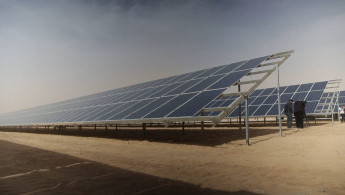Jordan opens world's largest solar plant in Zaatari refugee camp
The 4,000 solar panels have a total capacity of 12.9 megawatts and are designed to provide 14 hours of electricity a day to Zaatari's 80,000 inhabitants.
The project was financed by Germany at a cost of $17.5 million.
The UN's refugee agency (UNHCR) had previously been providing eight hours of electricity a day, costing $500,000 a month, said Stefano Severe, the agency's representative in Jordan.
"With this solar panel plant and this grant from Germany, UNHCR will be able to provide 14 hours with zero cost," he said at a ceremony at the camp attended by Jordan's Energy Minister Salah al-Kharabsheh and German ambassador Birgitta Siefker-Eberle.
He said the savings would be used to improve other services in the camp.
Twitter Post
|
The additional hours of electricity would improve the refugees' lives "by giving more opportunities for the kids to study in the night-time, for people to store food in their fridges, to communicate with the outside world", said Severe.
In May, Jordan scored a world first for a refugee camp powered by renewable energy, according to the UNHCR, when it opened a two-megawatt solar plant in Azraq which is home to 35,000 refugees from the war across the border in Syria.
Last month Jordan opened an EU-funded job fair in the sprawling Zaatari camp following a decision by the Jordanian government to grant residents work permits.
The UN says that some 650,000 Syrian refugees are currently being housed in Jordan, but the government puts the figure far higher at around 1.3 million people.





 Follow the Middle East's top stories in English at The New Arab on Google News
Follow the Middle East's top stories in English at The New Arab on Google News


